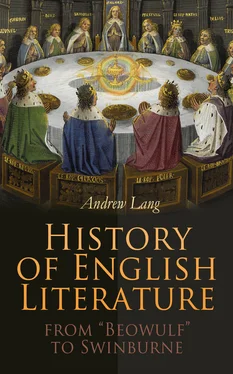Barbour possesses, unlike most of the narrative poets of the Middle Ages, one supreme advantage. He is not telling, for the twentieth time, the Tale of Troy, of Alexander the Great, of King Arthur, or of any dim mythical hero. The events in the history of Scotland which his own father witnessed, make one of the best stories in the world. Bruce was far from a faultless hero, but his adventures are picturesque facts, not inventions: though sometimes Barbour tells the same story twice, with variations. His many defeats, his wanderings in the heather, with a little company or with a single attendant; his flight over sea; his crossings of perilous lochs in frail boats; his single combats; the desperate chivalrous valour of his brother Edward; his own sagacity as a strategist and tactician; his kindness of heart; his love of the romances; the sufferings of his loyal friends, men and women; all his days of almost desperate warfare; all his escapes when surrounded in the hills of Galloway and of Argyll, are matters of historical fact, and can often be traced in English documents of the time. His "crowning mercy" Bannockburn, is as historical as Marathon or Waterloo.
When we think of the wild scenes in which Bruce warred and wandered, Loch Trool, Loch Awe, the whole of the Lennox, the uplands of Don and Dee; when we remember the blending of English armed knights, and of the plaided clans in the ranks of his enemies; his own combination of the Islesmen with "the dark impenetrable wood" of the Lowland spears; the many-hued silks of the standards; the cowled friars who prayed while the warriors fought; the fair ladies who shared the hero's dangers, we see that Barbour has a theme fresh, brilliant, and unique for his poem. He has a true story which is more thrilling than any invented romance.
Barbour notoriously, perhaps in the interests of poetic perspective, rolls up three Bruces, the grandfather, the father, and the hero himself, into one personage. Yet his statements of the numbers of the English engaged are sometimes corroborated by the English muster rolls. Before he has written three hundred lines he strikes the sonorous keynote of his narrative in that praise of Freedom which is worthy of the poet who fought at Marathon.
"Ah! freedom is a noble thing!"
In what other mediaeval romance can these lines be equalled? What wearies us in Barbour is the common defect of mediaeval poets, the occasional display of learning, references to what Cato did, or Hannibal, or Scipio, and the like, but Barbour is not tedious when, after giving a minute portrait of the good Lord James of Douglas, he compares him to Hector, though, for valour,
To Hector dare I none compare
Of all that ever in world were.
The story never drags, adventure follows adventure, and there is none of the weary exaggeration of romance. Bruce does not slay his thousands, like Arthur. When he, a mounted man in armour, Ms the better of three plaided clansmen, MacNaughton, who is of the hostile party, cries
Surely, in all my time,
I never heard, in song or rhyme,
Tell of a man that so smartly
Displayed such great chivalry.
But Bruce is soon obliged to give his horse to one of the ladies, and go on foot, like Prince Charles, living on such venison as his arrows may procure. Barbour has to invent no fanciful dangers; he knows the racing tides and dangerous shoals of Argyll—
The waves wide that breaking were,
Weltered as hills, here and there.
Unlike Chaucer, Barbour has a scorn of astrology: no man ever (he says) made three correct prophecies, by knowledge of the stars! He is far from scrupulous, and does not blame Douglas when, like Achilles, he slays prisoners of war: apparently because he could not take them with him in his retreat, and secure their ransoms. Barbour has not, of course, the genius of Chaucer; but he has a touch of the genius of Scott, he has spirit, and a true sense of loyalty, chivalry, and patriotism; these, with his subject, place him beside Chaucer in so far as that he may still be read with unaffected enjoyment.
Between Barbour and the first true Scottish disciple of Chaucer, James I, comes the author of a Chronicle in rhyming octosyllabic couplets "The Orygynale Cronykil". This is Andrew Wyntoun, who was a canon of St. Andrews Cathedral, and prior of St. Serfs on a little island in Loch Leven, the loch of Queen Mary's captivity. Wyntoun appears to have been an old man when, in 1413, the first Scottish university was founded at St. Andrews, by a bull of the Anti-Pope, Pedro de la Luna. The place must, with its Augustinian canons, have been a seat of learning before 1413, but the new university was very poor, and a thing of small beginnings.
Wyntoun's book commences with Adam and Eve, and is at fifth hand and fabulous till the author approaches his own time.
Mythical as is his work when he approaches his own date he, with Fordun, the really industrious author of the prose "Scotichronicon" (died about 1384), is one of our few sources of information about Scottish affairs. Wyntoun is amusing, but does not pretend to high poetic merit.
To people who only know King James I of Scotland in history, his poem, "The Kingis Quhair" (book) must be rather disappointing. Fortune was his foe, as he says in the poem, and the foe of his House.
Born in July, 1394, young James was made prisoner in March, 1405-1406, and, for about eighteen years was a captive in England, or was led with the army of Henry V against his natural ally, Charles VII, the Dauphin of Jeanne d'Arc. The ransom demanded from James when released, in 1423, was ruinous; of his hostages, noblemen, some died in England; he found his country full of anarchy and treason; the disorders he suppressed with illegal vigour; he seized earldoms to which he had no right, he made powerful enemies, and, in 1437, he was slain by Robert Graeme and a band of Highlanders, at the Black Friars' in Perth. In England he had married Joan Beaufort, daughter of the Earl of Somerset, who lived to avenge him on his murderers with unheard-of cruelties.
When a man of James's intellect, character, and experiences writes a poem on his own taking at sea by faithless foes, his own long captivity, and his own love-story, we naturally expect something of poignant personal interest. But we expect what his time, his taste, and his rank forbade him to give. Never was poetical tradition so crushing to originality as the tradition of the "Roman de la Rose".
For centuries each mediaeval poet aimed at saying just what his forerunners had said, and in much the same style: Barbour, of course, is an exception; he does not open with a sleepless night; a book read in bed; a dream of a May morning; a walk to a pretty river, a palace near the river, and all the rest of it. Barbour writes "like a man of this world".
But King James follows the fashion of allegory. He cannot sleep; he reads Boëthius in bed, Boëthius "full of moralities". He lies thinking over his sorrows when (this is original), the bell for matins rings, and
Ay me thought the bell
Said to me, tell on, man, quhat the befell.
He did not think that the Voice was a real Voice, "impression of my thought causes this illusion," said he, and though he had "spent much ink and paper to little effect," he sat down, made a mark of the cross, and set to work at his tale, first comparing his life to a ship in perilous seas, and then briefly mentioning his capture when about three years past the age of innocence (which was seven, he was, when taken, four years past seven). Birds, beasts, and fishes, he says, are free, why does Fortune make me thrall? He looks out of his window into a green garden; the nightingales sing; he sees, and describes very prettily, a fair lady walking with her two maidens, and falls in love. In all probability this is a mere imitation of the first sight of Emily by Palamon and Arcite, in Chaucer's "Knight's Tale". James would meet Jeanne in society: he was not a close prisoner, we are told that he knew many English ladies, and the course of his true love ran smooth enough. But the description is charming, as is the address to the nightingale which follows.
Читать дальше












